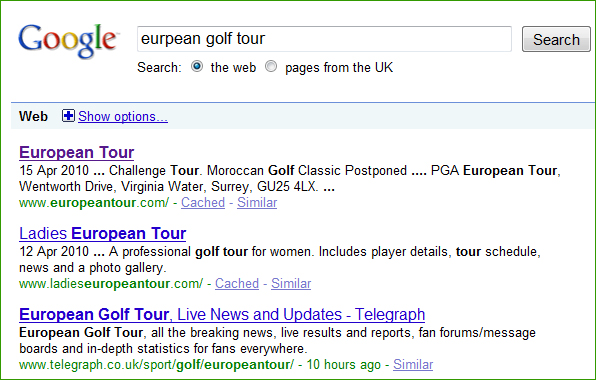Some examples include a request to improve the ranking of a company who was considering trading as “European Golf Tour” – the 3 main key words they predicted people would search to find their website. Others include Essex-based photographers who generally want to rank for phrases such as “wedding photographer essex”. We also have a huge request from printing companies who want to rank for phrases such as “colour printing” or “leaflet printing”.
Queries are Categorised
Google decides on which results it will present to its users by using its many algorithms to determine what each search query deserves. Broadly speaking, Google categorises your search queries into 3 broad areas:
Navigational:
e.g. the user want to go directly to a website e.g. Apple, BBC, Mercedes.
Informational:
e.g. how fast can a cheetah run? What year was the Battle of Waterloo fought?
Transactional:
e.g. best price for silver ipod nano
Or as Google referes to them: entertainment, enlightenment or information. Which I find incorporates the above categories.
So, if Google determines that a search query deserves a navigational result (one that will show the brand owner’s website at No.1 position, then no matter what SEO you do, you will not knock that website off the top spot.
To make this clearer try searching for “eurpean golf tour”. You will see that europeantour.com is at the top spot. This has nothing to do with SEO directly. This is what Google’s calculates that the majority of its users would want navigate to when using those keywords in that exact combination. And I’m sure they’re right.

My point is, is doesn’t matter how much effort you put into optimising your website for a given set of keywords, you will never out-rank a site that falls within a different category to the one your site is classified as (or optimised for).
Keyword Saturation
Broad commercial keywords have saturated billions of web pages in an attempt to optimise websites. Google doesn’t want to show results to its users that are not relevant to a user’s search query.
The Long Tail
Its well worth considering more specific sets of keywords. E.g. if you where selling tennis rackets, try optimising for product-specific terms such as:
Babolat AeroPro Drive GT – a very specific product query which strongly indicated the user would like to see prices and therefore a possible purchase – and deserves a transactional result from search engines.
The downside to the long tail is it will not generally yield high volumes of traffic, which provides enough brand awareness and / or space for advertisers. However the main point of this post was to persuade you to consider your own branding when looking into SEO.
A Solution: Branding
Historically, marketing agencies would focus heavily on brand recognition across channels such as direct mail, TV ads, POS etc., without a successful method of measuring their ROI (return-on-investment).
Since search marketing gained momentum (around 1999) more and more marketing budgets have been allocated towards SEO and PPC. Apart from being measurable, an ROI can start within minutes of deploying a campaign.
Going back to my European Golf Tour example, a company called Hi 5 Golf Tours has done a great job of positioning themselves fairly high within their marketplace. For the same query: “european golf tour” they are ranked no. 4.
We’ve been working on brand awareness for a handful of our clients and have reported significant shifts in search behaviour for those client’s products and services. An increasing number of non-branded keywords which were formally used are being switched for branded keyword searches. This trend, I believe, will grow over the coming year.
Food for thought, I hope.

